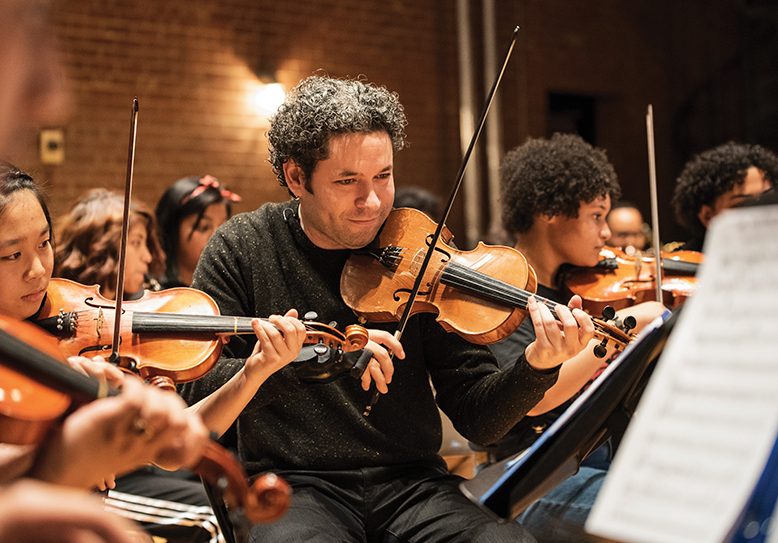
Even if you don’t know Schubert from Chopin, you’ve likely heard of maestro Gustavo Dudamel. The Venezuelan conductor and violinist has appeared on everything from Sesame Street to 60 Minutes. Music director of the Los Angeles Philharmonic, Dudamel, 38, is completing an academic year as Princeton University’s first artist in residence.
Dudamel will lead two performances this month with the Princeton University Orchestra and Glee Club: April 26 at the university, and a free concert April 27 at Patriot’s Theater at the War Memorial in Trenton. The April 26 show quickly sold out. For Trenton, 1,800 tickets will be made available April 1 at princetonuniversityconcerts.org or by calling 609-258-9220.
Empathic and shaggy haired, Dudamel is one of the most charismatic and communicative conductors since Leonard Bernstein. When not hanging with friends like architect Frank Gehry and director Alejandro Inarritu, he guest conducts the Vienna Philharmonic and other famous orchestras. “I believe in music’s unique power to unite,” he says by e-mail. “Especially in these challenging times, art can help remind us of the values we have in common.”
Dudamel, the son of musicians, grew up in Caracas. “When I conduct an orchestra of young people, I see myself there, among them, working, playing, fighting, laughing. That is where I come from,” he says. “It takes me back to my roots in El Sistema and to the ideals that made me who I have become.”
El Sistema is a system of teaching music to kids that started in Venezuela and has spread worldwide, including more than 200 programs in the United States. Its key tenet: anyone can join, even poor students who can’t afford an instrument. “El Sistema promotes access to music for everyone,” Dudamel says. “That is its great strength and why it offers such hope for thousands of people in hundreds of countries, from all walks of life.”
Since arriving in Princeton in September, Dudamel has introduced the spirit of El Sistemo to Mercer County. He ventured from the ivied campus to work with student musicians in the Trenton Music Makers program and in Trenton public schools. His dream for his residency, he says, is that “through music, really through all the arts, we can make connections between different disciplines at the university and between the young people of Princeton, Trenton and the surrounding community.
“An orchestra,” he adds, “is a perfect example of a society. A hundred people, each bringing their own talents, perspectives and histories to work. They play an instrument, which is part of a group, which is part of a section, which is part of the whole orchestra.”
The positivity, musically and otherwise, begins with listening. “As a conductor, I see it as my most important job to encourage the musicians to listen to one another,” he says. “That is how we make the best music together. Rather than try to drown one another out with their own voices, if political leaders would learn something from our model of the orchestra, I think our world would be a much different place.”



